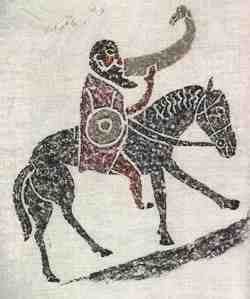In 55 BC, Julius Caesar took his first “expedition” to Britain. The Britons, however, saw this as more of an invasion, which is what it turned out to be. Julius Caesar knew that victory in battle would win him popularity, and thus began the Roman occupation of what they called Britain.

Romans landing in Britain
As can be imagined, the people inhabiting Britain at the time did not
take kindly to the Roman invaders. They cut off all tribute
to Rome, and rebelled frequently.
The Romans occupied the southern half of Britain, while the native people,
called the Picts
by the Romans, lived in the northern half, and frequently gave the Romans
trouble.

A Pictish warrior
In 122 AD, the Roman emperor Hadrian visited Britain. He saw the problems
the Picts were causing, and ordered the building of a huge wall to mark
the northernmost frontier of the Roman Empire. It took soldiers and legionaries
six years to complete the wall. It was fittingly named Hadrian’s
Wall, after the man who had ordered its construction.
Although the wall stood as a symbol of Rome’s ultimate power, the
Picts were not intimidated. In 158 AD, they successfully attacked Hadrian’s
Wall, and seriously damaged it. They also destroyed the Antonine Wall
(north of Hadrian’s wall) at this time. Later, in 306 AD, the Picts
grew bold and raided far south of the wall—as far south as modern
day London. In 383 AD, they again breached Hadrian’s Wall. This
time it was so badly damaged that it took the Romans 24 years to rebuild
it. In 396 AD, the Picts attacked the wall again. Soon afterwards, in
409 AD, the Romans finally decided to pull out of Britain.
Here is an excerpt of a story about the Roman withdrawl from Britannia.
It can be found on the site http://www.albawest.com/picts.html.
“One year a strange thing happened. An army of Picts had gone
south to attack Hadrian's Wall, but as they drew near it became obvious
that the Roman sentries weren't at their posts, in fact not one Roman
soldier could be seen. The Picts used ladders and ropes and eventually
the whole army climbed on top of the wall and began cheering. Surely any
minute now the legions would realise what had happened and come in their
droves to take up battle positions? Eventually as the cheering died down,
there was an eerie silence, only the sound of the wind blowing the length
of the wall. Fearing an ambush the Picts slowly approached and searched
through the nearest forts and barracks, but not one Roman could be found,
it seemed that the Wall was only defended by the ghosts of the dead legions.
The army fanned out to the adjacent forts and barracks but again the whole
place was completely deserted. The Picts continued to move south raiding
as they went and everywhere the story they heard was the same - the Romans
have gone, they have completely pulled out of Britain and taken every
last soldier back to defend Rome. Perhaps the Picts felt that it would
have all ended with a massive battle where the Romans were so defeated
that they would have fled from Britain - instead of ending with a bang
it had ended with a whimper.
The Picts must have had a big party that night and have made up poems, songs, riddles and jokes, saying things like, ‘Why do all roads lead to Rome?’ ‘Because you never know from which direction the army will retreat next'. And, ‘They came, they saw - they had to go back because their house was on fire’.”
